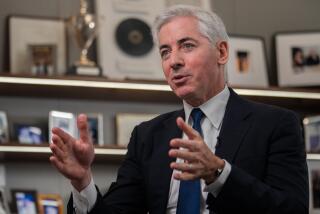NYSE fine may further erode investors’ trust in stock markets
Investors’ faith in the stock market has been shaken badly in recent years, and Wall Street’s latest trading snafu could further chip away at their trust.
The New York Stock Exchange agreed Friday to pay $5 million to settle charges that it made stock quotes available to select customers before the general public. It was the first-ever monetary penalty against a stock exchange.
The fine itself was a pittance by Wall Street standards, and professionals got the quotes by only seconds, or even fractions of a second, before everyone else.
But that’s a big leg up in today’s lightning-fast trading world. In essence, it would enable a professional to buy a stock before a small investor could even react, forcing the individual to pay a higher price seconds later.
“Their biggest clients were getting a built-in advantage,” said Sal Arnuk, a partner at Themis Trading in Chatham, N.J. “It’s like seeing who won a horse race and being able to bet before everyone else.”
Beyond that, experts said, it risks feeding the notion among disaffected small investors that the stock market is tilted against them.
Small investors have suffered bruising losses in the stock market over the last decade, and many have grown weary of the repeated scandals on Wall Street. And a string of blunders, including the software debacle at Knight Capital Group and botched handling of Facebook Inc.’s initial public offering, has left investors wondering whether Wall Street has lost technological control.
“The individual investor sees this and they rightly conclude that we’ve taken the most simple process in the world, the matching of buyers and sellers, and perverted and distorted it in the most unfair and obscene way,” Arnuk said.
The Securities and Exchange Commission accused the Big Board of giving an “improper head start” to certain customers. The NYSE’s trading system gave a “faster path” to some private customers, while a separate “software issue” delayed the publishing of data to the public, according to the SEC.
“Improper early access to market data, even measured in milliseconds, can in today’s markets be a real and substantial advantage that disproportionately disadvantages retail and long-term investors,” said Robert Khuzami, head of the SEC’s enforcement division.
The NYSE said the problems, which occurred from 2008 through mid-2010, were unintentional and had been corrected.
“The timing differentials stemmed from technology issues, not from intentional wrongdoing by the exchange or any of its personnel,” said Duncan Niederauer, the Big Board’s chief executive.
As is common in such settlements, the NYSE neither admitted nor denied the SEC allegations.
The delays probably did not cause small investors to directly lose money because few individuals engage in the sort of rapid-fire trading that has become common on Wall Street, said Benn Steil, an expert on stock exchanges at the Council on Foreign Relations in New York.
But it “adds to the perception that the market is skewed against the little guy,” Steil said.
“A mistake like that clearly was a very valuable one to their paying customers,” he said. “It’s one they clearly had an incentive to turn a blind eye to for as long as it went unobserved.”
Split-second trading has become a huge force in recent years as so-called high-frequency trading firms jump in and out of stocks with blazing speed.
Some trading operations have even set up computer servers in buildings near the NYSE’s downtown New York trading floor to gain access to stock prices milliseconds earlier than their competitors.
Critics say the high-speed frenzy distorts the market and gives professionals a key edge over individuals. Defenders say the criticism is overblown and that long-term share values rest on the condition of the economy and corporate earnings.






